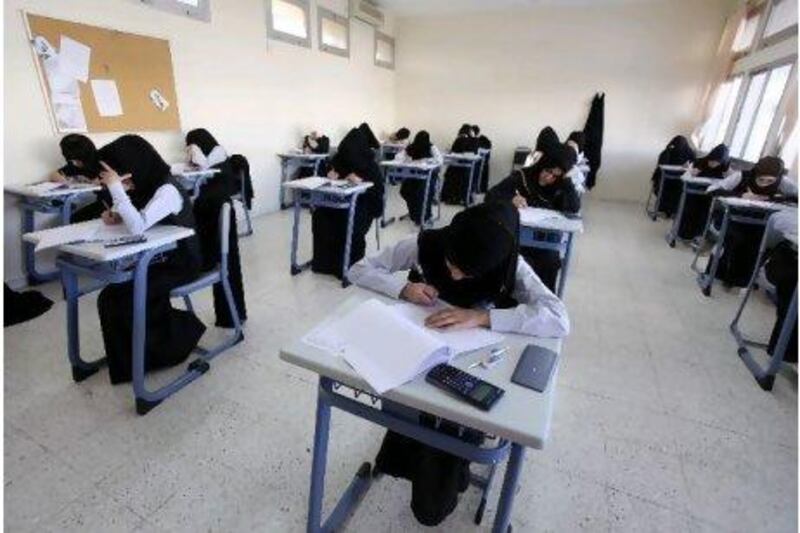DUBAI // Girls in public schools outperform boys in the classroom because they get a better standard of education, a report says.
Dubai had the third-highest disparity between genders in science of 65 countries tested by the Programme for International Student Assessment (Pisa), with girls scoring an average of 27 points more than boys in public and private schools.
"The [public] schools vary in quality to a large extent," said Mike Helal, the director for the Middle East and North Africa at Parkville Global Advisory, which compiled a Pisa report for the emirate's education authority.
"The all-girl public schools benefit from better teachers, improved methods and a higher quality of leadership."
Comprehensive results and an analysis of the standardised tests, which were taken by UAE private and public-school pupils for the first time in 2009, were released by the Knowledge and Human Development Authority (KHDA) yesterday.
The Pisa language, maths and science tests recorded a gender gap in many countries, but Dubai's report found a much wider disparity.
Girls scored 51 more points on average in reading literacy than boys, whereas the average difference found by Pisa globally was 39 points.
There was no significant difference between the sexes in mathematics. The Parkville Global Advisory report said the disparity was most pronounced among public school pupils.
"There is a strong correlation between the curriculum and the magnitude of the gender divide," it stated.
At public schools, male pupils fell 82 points behind their female peers in reading. The report suggested this could be attributed to the improved learning at female-only schools.
The report also suggested the process by which pupils were made to repeat a class if they failed slowed down male progress.
"There is a significantly higher number of male pupils who are held back through continuous failure in comparison to female pupils," it said.
"Many are at least one year behind in school. This retention method, in fact, reduces the likelihood of pupils catching up in skills that can be acquired with every additional grade level."
Mr Helal said 15-year-old pupils were expected to be in Grade 10 according to the UAE system, but many Emirati boys of that age were still in Grade 9.
Dr Naji Al Mahdi, the executive director of the National Institute for Vocational Education in Dubai, agreed with Parkville's findings and said he blamed the poor performance of male pupils on the "shortcut options" available. "Boys know they can still get some government jobs without completing their high-school education and that kills their motivation to do well or excel," said Dr Al Mahdi.
"A lot of them just drop out, find the easy route and that is the same example they set for their children."
He said social factors might also drive young women in the region to perform better.
"For many national girls the only chance they get to socialise outside the home is when they are studying or working. This becomes a strong incentive," Dr Al Mahdi said.
"Also, there is a push here to get women educated and that is why we see a majority move on to university, which is not the case with boys."
Compared with schools following the national curriculum, International Baccalaureate schools had the lowest gender variation, the report showed.
KHDA will be sending results to each of the 134 schools that participated in the Pisa test, and will share the full results with education officials for policy recommendations.
Fatma Al Janahi, the head of international assessment at the KHDA, said the process had helped the authority to evaluate standards in different schools and provided a comparison of the effectiveness of different curriculums.
"Pupils' performance is linked to their personal, home and school factors, which allows us to understand how they learn and acquire skills within that context," she said.
Schools in Abu Dhabi and the Northern Emirates took the Pisa last year and expect to receive their results later this year.






